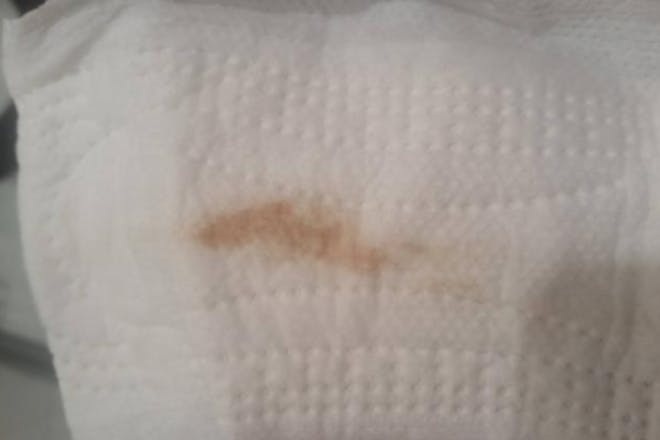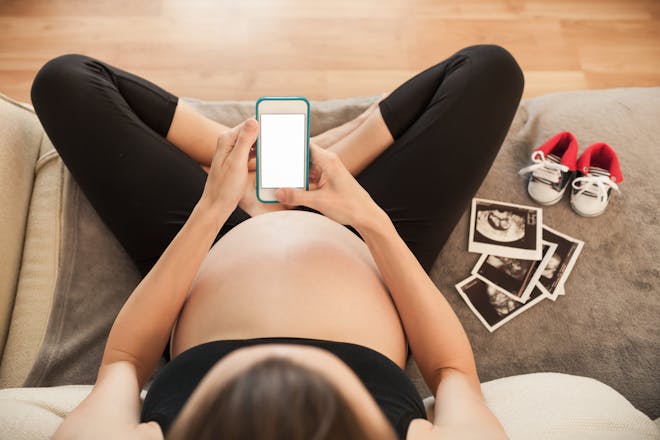Early signs of pregnancy: am I pregnant?

This page contains affiliate links, which means we may earn a small amount of money if a reader clicks through and makes a purchase. All our articles and reviews are written independently by the Netmums editorial team.
If you're TTC and dying to know if that discharge, twinge or cramp could be a sign that you're pregnant, then read on. In that two-week wait before it's time to take a pregnancy test, we look at some of the early signs and symptoms of pregnancy that could be just mean you're having a baby.
How soon after conception can you get pregnancy signs?
We all know about morning sickness, bigger boobs and weight gain kicking in once we're pregnant. But did you know it's actually possible to get early signs and symptoms of pregnancy just days after you've conceived, before a missed period?
Here are some of the early clues you might experience in the first few days or early weeks of pregnancy:
- Period-type pains (but no period)
- PMS (cramping, bloating, headaches, heartburn, indigestion, feeling overly emotional)
- Brown discharge
- White discharge
- Spotting
- Sore, tender or tingling breasts
- A metallic taste in your mouth
- Tiredness
- Nausea and sickness
You just want to scream 'am I pregnant?' and get the answer, now. But with such a long and varied list of symptoms to look out for, how can you be sure what each symptom means?
FREE NEWBORN NAPPIES
We take a closer look into some of the most common early pregnancy signs and symptoms, including the science behind them ...
Period-type pain and PMS
There are some similarities between PMS and very early pregnancy symptoms so yes, if you have mild cramping in your lower back or pelvis, it could be a sign you are pregnant, especially if you've been trying to conceive.
Cramping can be a sign that a fertilised egg has attached itself to the wall of your uterus. While some women notice this mild cramping, not everyone will – or you may assume it's menstrual cramping and your period is on its way.
If you're experiencing severe cramping or sharp pains, especially if they're accompanied by bleeding, see your GP immediately as this can be a sign of miscarriage or ectopic pregnancy.

It's not uncommon to experience other PMS symptoms such as bloating, indigestion, headaches or feeling overly emotional in early pregnancy. These can be caused by a change in hormones once you've conceived and early pregnancy symptoms can easily be confused with PMS.
Discharge
White discharge can be a very early sign of pregnancy: as the vagina walls start to thicken quite quickly after conception, this can cause a white, milky discharge.
Implantation bleeding
'Implantation bleeding', is thought to happen when the fertilised egg attaches to the lining of the womb, shortly after conception. As it gets into position, ready to start growing, a small amount of blood can be released.
This is why it's very common for pregnant women to notice a little bit of blood around the time their period is due.
Because implantation bleeding happens around the same time as a period, it can be easy to confuse the two.
Here are some ways to tell the difference between implantation bleeding and your period:
- Implantation bleeding is usually very light, sometimes just a few spots of blood.
- A period usually lasts longer than implantation bleeding, which typically stops after a day or two.
- Period blood is more likely to be bright red, while blood from implantation bleeding is often darker. Sometimes it looks like a brown discharge.
- Cramping and discomfort is usually stronger with a period than with implantation bleeding.
If you're bleeding, the NHS says it's always best to get in touch with a GP or midwife, just to be on the safe side.

Spotting
Light bleeding, or spotting, is very common around the time your period would have been due - some women notice it when wiping after using the loo.
This is for exactly the same reason as some may experience brown discharge, ie an implantation bleed.
While, like brown discharge, spotting is quite normal and is not usually a sign of early miscarriage, it's worth getting any early bleeding checked out by your GP
Sore boobs
Sensitive breasts are often one of the very first signs of pregnancy, along with sensations such as tingling, or sore nipples.
This is caused by increased levels of the hormone progesterone and the development of your milk ducts in preparation for breastfeeding (yes, already!).
A comfy sports bra should help you feel more comfortable. Bear in mind that, if you are pregnant, your breasts are probably going to grow a lot over the coming weeks and months! So now may not be the best time to splash out on new lingerie.
Learn more about how pregnancy changes your breasts.
A metallic taste
A metallic taste in the mouth is one of the weirder pregnancy symptoms, but also one of the most common. This is due to hormone changes.
Keeping a packet of mints handy is a good idea if the taste really bothers you.
Cravings can also kick in at this stage, or you might also go off some of your favourite food and drinks, like tea or coffee.
Overwhelming tiredness
If you thought you knew what tired felt like, think again. Nothing compares to early pregnancy exhaustion.
Another one to blame on your hormones, and there's not a lot you can do about it, other than resting when you can, eating well and getting plenty of sleep at night.
Nausea and sickness
It's the pregnancy symptom everyone knows about, and for good reason: so-called morning sickness affects most pregnant women, with more than 80% experiencing nausea, and half suffering from actual vomiting. And although the name suggests a short window, it often lasts all day and night, not just the morning.
Pregnancy sickness is most common in the first 12 weeks due to hormonal changes. It's miserable, but almost always clears up by weeks 16 to 20.
You may also notice that you're more sensitive to smells in the early stages of pregnancy and that your usual perfume or certain cooking smells can make you retch; a good excuse to delegate dinner duties to your other half.
Many women swear by keeping a pack of ginger biscuits by the bed, and nibbling on one before getting out of bed in the morning. Get more tips for coping with nausea here.
Some women develop a severe form of sickness, with extreme, prolonged vomiting. This is known as hyperemesis gravidarum and needs medical attention, so see your GP if you can't keep any food or drink down.
When to take a pregnancy test
Some of us have no early pregnancy signs whatsoever – but even if you have every symptom mentioned above, it's no guarantee that you're expecting.
The only way to be sure is to take a pregnancy test, ideally from the first day of your missed period.
Some modern pregnancy tests claim to give accurate results before your period is due, but waiting until you've missed your period will usually give you the most reliable answer.
If the test is positive
False positives are highly unlikely, so if the test is telling you you're pregnant, you can safely assume you are!
If the test is negative
If your own instincts are telling you otherwise, wait a few days and try again. It may just have been too early for a positive result.
If you've waited a few days, and you're still getting a negative result, you might not be pregnant. Many factors can affect your periods, from stress to sudden weight loss.
If you've missed three or more periods, the NHS recommends making an appointment with your GP.
You're pregnant, now what?
If your early pregnancy symptoms are confirmed then it's time to see your GP. He will work out a rough due date and talk through your nearest labour wards or birthing centres and will be able to book you in.
You'll then be contacted directly with the first of your antenatal appointments, known as your booking appointment. This usually happens when you're around 8–12 weeks pregnant.
Read more about what to do now you're pregnant here.
Watch what you eat and drink
Whether you are in the early stages of pregnancy, or are trying to conceive, guidelines suggest making some changes to your diet. These include:
- taking folic acid; the NHS says you should take a daily supplement of 400 micrograms of folic acid before you are pregnant until you are 12 weeks pregnant.
- stop drinking alcohol
- eating healthy, balanced food
- avoiding certain foods
- quit smoking
You don't have to stop eating all your favourite food if you're pregnant, though. Did you know that Stilton is still allowed?! Find out more about what to eat and drink during pregnancy here.
Review your medication
There are some medicines that are best avoided during pregnancy, as they could have side-effects for you and your baby..
However, if you're on any medication, it's very important that you don't stop taking it without talking to your GP.
They'll help you weigh the risks and benefits, and make the best decision for you and your baby.
Keeping it a secret
Once you find out you're pregnant, it can be tempting to shout it out from the rooftops – especially if you've been trying to conceive for a while.
Alternatively, you might prefer to keep the news a secret until you've had your 12-week scan and heard your baby's heartbeat for the very first time.
According to Tommy's, over 80% of miscarriages occur before 12 weeks so the risk dramatically reduces once you reach the second trimester.
Of course, it's your news to tell or not tell.
But, if you do decide to keep it a secret, here are some ways to hide your pregnancy in the first 12 weeks.





